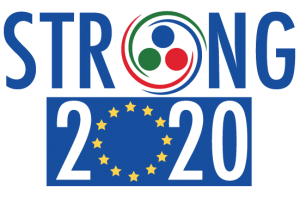The STRONG-2020 European project obtained a funding of 10 millions Euro for four years. Our group coordinates the networking activity “FAIRnet – QCD physics at GSI/FAIR”. Below you can find a press release with some details about the project.
STRONG-2020: the new European project at the forefront of strong interaction studies
The theoretical and experimental studies of the strong interaction, a cornerstone of the Standard Model (SM) of particle physics, attract an active community of about 2500 researchers in Europe. The list of open questions at the frontier of our present knowledge in this field is rich, and include a full understanding of: the tridimensional structure of the proton; the spectroscopy of hadrons and their exotic states; the properties of the hot and dense quark-gluon plasma; precision studies of the SM. These research topics are experimentally studied mostly by particle collisions at low (GeV range) and high (up to 14 TeV) energies, which require continuous developments in state-of-the-art detectors, data acquisition systems, beams and targets, as well as in the underlying theory.
The STRONG-2020 project, a four years European Integrating Activity for Advanced Community recently approved by the European Community within the Horizon-2020 – Research and Innovation Framework Programme, is a structured enterprise to address the open questions in the strong interaction studies in theory and experiment, building upon and going beyond the previous Hadron Physics HP, HP2 and HP3 projects in the framework programmes of FP6 and FP7. Financed with 10 MEuro, STRONG-2020 will start in summer 2019.
STRONG-2020, strongly supported by NuPECC (the Nuclear Physics European Collaboration Committee), brings together many of the European leading research groups and infrastructures presently involved in the forefront research in strong interaction. It provides transnational access to six world-class research infrastructures in Europe, which complement each other in particle beams characteristics (COSY, MAMI, LNF-INFN, ELSA, GSI, CERN) and virtual access to open-source codes and automated/simulation tools. STRONG-2020 fosters the synergy between theoreticians and experimentalists, supporting the activities of the European Centre for Theoretical Studies in Nuclear Physics and Related Areas (ECT*, Trento).
The STRONG-2020 Consortium includes 44 participant institutions, among which the Ruhr-University Bochum, embracing 14 EU Member States, one International EU Interest Organization (CERN) and one EU candidate country (Montenegro). Together with host institutions of other 21 countries, participating in the activities without EU benefits, STRONG-2020 involves research in 36 countries. The project is structured in 32 Work Packages (WP): Project Management and Coordination, Dissemination and Communication, 7 Transnational Access Activities, 2 Virtual Access Activities, 7 Netwoking Activities and 14 Joint Research Activities.
The STRONG-2020 results will have a significant impact in the study of the strong interaction and the SM. The project will also contribute to fundamental research for physics beyond SM, impacting in other scientific sectors, such as astrophysics and theories of strongly coupled complex systems in condensed matter. The tools and methodologies for the new-cutting-edge experiments within STRONG-2020 will provide upgrades to the European Research Infrastructures, enhancing their competitiveness. The developed technologies will also impact in medicine (diagnostic tools, cancer treatment) and industry (line-scan cameras, 3D-magnets technology) and may also lead to advances in computing/machine learning.
STRONG-2020 will promote training and education activities, including students and postdocs, which will bring qualified personnel to the job market, as well as dissemination activities at current state of the art in science communication.

